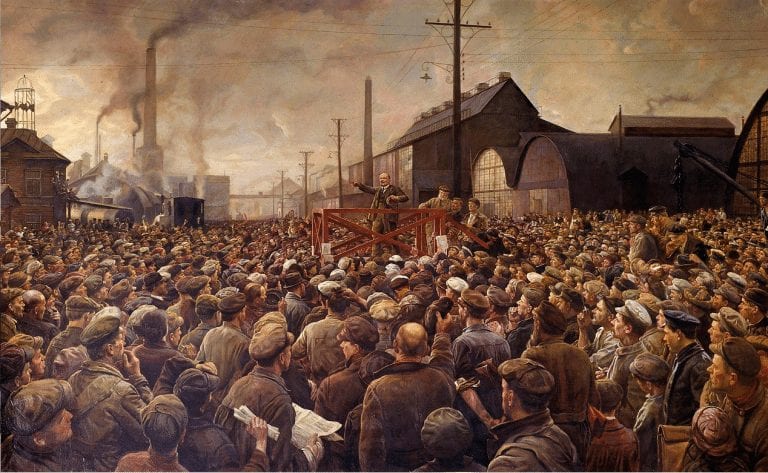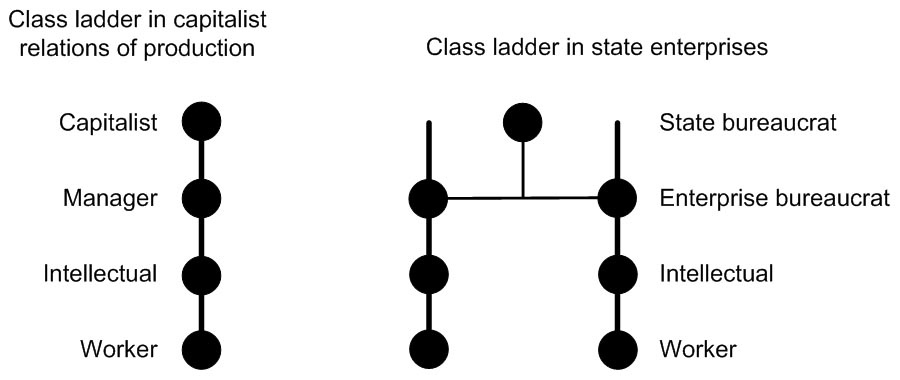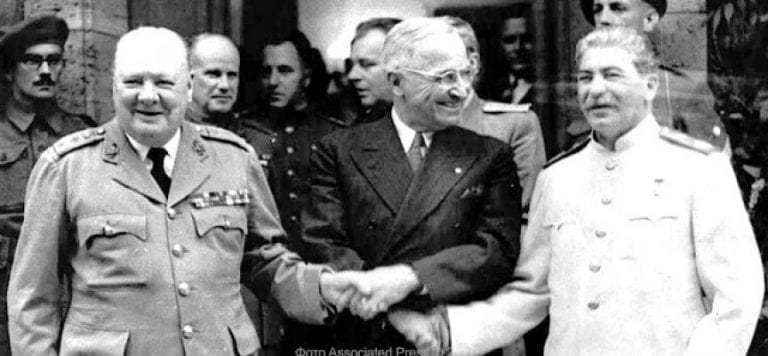‘Peace Through Strength’ is a Racket
by SHELDON RICHMAN
Donald Trump has embraced the popular “peace through strength” doctrine (PTSD) with his characteristic panache:
“I’m going to make our military so big, so powerful, so strong, that nobody — absolutely nobody — is gonna to mess with us,” Trump says. On other occasions he’s said similar things: “We want to defer, avoid and prevent conflict through our unquestioned military strength” (same link) and, a year ago, “Nobody is going to mess with us. Nobody. It will be one of the greatest military build-ups in American history.”
I will acknowledge that the PTSD has surface appeal. Why not show the world the United States is so awesomely powerful that no one in his right mind would even think to get on its wrong side? It seems to make sense in a practical sort of way.
Once people believe that, of course, they are softened up to accept unlimited military spending and the concomitant deficits and debt. As John T. Flynn used to say, military spending is a favorite of big-government types precisely because the conservatives won’t object. Conservatives rail against even small amounts of so-called foreign aid and welfare, but they drool over monstrous sums for the armed forces and spy agencies. (Thankfully, some conservatives don’t.) Progressives, by the way, are not immune to the allure of military spending. When a Pentagon budget cap was debated a few years ago, Rep. Jim Clyburn, Democrat of South Carolina, a leading progressive, and a Black Caucus leader, opposed it because he feared losing jobs in his district. Military spending thus has something for nearly everybody: strength for conservatives; economic stimulus for progressives. The conservative Keynesians like both justifications.
It takes only a few minutes to see that the PTSD is a racket intended (by some of its advocates at least) to gull the unsuspecting populace into supporting whatever the war party and the Pentagon want. It is handy for parrying the antimilitarist’ charge that its espousers are dangerously reckless, if not outright warmongers. “We’re not warmongers,” they can reply. “A military second to none will prevent war and promote peace. We’re the peaceniks. You doves are the promoters of war.” They are also likely to quote (without knowing the source) Publius Flavius Vegetius Renatus’s De re militari, “If you want peace, prepare for war.”
Brilliant! — but the doctrine encases a racket just the same, much as “war is a racket,” as the highly decorated U.S. Marine Maj. Gen Smedley Butler put it. (Please follow that link.) I’d like to meet the grifter who thought it up.
At least one thick book could be written on the flaws in the doctrine. I can sum them up by invoking the law of unintended consequences and the law of perverse incentives, by which I mean the well-established public-choice problems regarding policymaking and voter interest. People may have the best intentions in supporting the PTSD, but they have absolutely no reason to believe the policy would be carried out as they envision. We must expect the worse, or as David Hume charmingly wrote, “Political writers have established it as a maxim, that, in contriving any system of government, … every man ought to be supposed a knave.” Had we listened to Hume, many fewer things would have gone awry.
Trump’s deployment of the PTSD suggests that the U.S. military isn’t already powerful enough to deter an attack. But that is balderdash. The government now spends more on the military than the next 12 countries combined. The recent increase alone was bigger than Russia’s entire military budget.
But that is an understatement because the Pentagon budget is far from the total amount the U.S. government spends on “national security.” Robert Higgs wrote in 2007:
Hardly anyone appreciates that the total amount of all defense-related spending greatly exceeds the amount budgeted for the Department of Defense. Indeed, it is roughly almost twice as large….
Lodged elsewhere in the budget, however, other lines identify funding that serves defense purposes just as surely as—sometimes even more surely than—the money allocated to the Department of Defense. On occasion, commentators take note of some of these additional defense-related budget items, such as the Department of Energy’s nuclear-weapons programs, but many such items, including some extremely large ones, remain generally unrecognized.
Thus when George W. Bush formally proposed to spend $583 billion on the military in fiscal 2008, Higgs calculated the real tab at $934.9 billion. The story is the same today. We may reasonably ask: how can Trump know the military isn’t already powerful enough to deter any would-be attacker and how can he know that spending less would make Americans less safe? What we have here is a knowledge problem, which politicians and bureaucrats are likely to exploit in favor of more spending. By PTSD standards, no amount of spending is enough: “If I’m wrong,” the militarist will say, “we’ll blow a few bucks. If you’re wrong, we’ll be speaking Russian, Chinese, Arabic, or Farsi.”
The war party tries to bolster its case by claiming the U.S. military was hollowed out by Barack Obama; thus we must rebuild. Bullfeathers! As Nick Gillespie of Reason pointed out a year ago:
There’s little doubt that the military is exhausted. Since 2001, we’ve been waging endless wars, including in countries against whom we’ve never officially declared war. We’re still in Afghanistan and Iraq, of course, and all signs point to boots on the ground in Syria sooner or later. War footing isn’t simply expensive (even if we’re spending less on “overseas contingency operations” that we did in the mid-Aughts), it introduces incredible strain and stress throughout the military and society at home.
But depleted, underfunded, undersized, unready? Please. Defense spending ratcheted up during the Bush years in the aftermath of the 9/11 attacks, the invasion of Afghanistan, and the war in Iraq. It hasn’t come close to coming back down. In a nation that has supposedly wound down two of its longest wars and where the principal threat to the homeland is a group of religious extremists who live thousands of miles away (and are, lest we forget, a byproduct of our own failed occupation of the Middle East), we always need more money for defense, right?
To be sure, Trump has doubled down on all the Bush-Obama wars, but those have nothing to do with the safety of Americans. Therefore the personnel could be brought home and the military budget cut.
To put things into perspective, when Dwight Eisenhower was president, at the start of the Cold War, his annual military budgets for seven out of his eight years were under $400 billion (in 2012 dollars) — less than Harry Truman bequeathed him. So why does Trump need $716 billion today (to use the official but incomplete figure) when the Soviet Union is long gone, Russia’s military gets only $47 billion, and China, which spends $192.5, is a major trading partner? (We’ll get to Iran and North Korea shortly.)
Another objection to the PTSD is the temptation the overgrown military establishment presents to policymakers. This was best articulated by Bill Clinton’s secretary of state, Madeleine Albright, who recounts in her memoir how — in the late 1990s, as Clinton was looking to intervene against Serbia — she asked Joint Chiefs Chairman Colin Powell, “What’s the point of having this superb military that you’re always talking about if we can’t use it?” Here was the supposed chief diplomat more or less saying, “We’ve got this big hammer, so why not see every problem as a nail.”
Government officials, hiding behind classified material, can easily inflate and even create so-called threats, and they have an obvious incentive to do so. Moreover, a big military is going to be a menacing military because it will conduct war games close to other countries; when governments respond, they can be accused of provocation and aggression. (In contrast, American moves are never provocative.) And yes, politicians and bureaucrats lie, especially in foreign policy. War is a lie, to appropriate David Swanson’s book title. Post-Vietnam, we should not have needed to be reminded of this danger, but we sure got a reminder with Iraq in 2002-03.
Who do the PSDT advocates think would attack the United States unless it has a bigger military? Who presents an existential threat? Some will say we no longer need to fear a conventional attack or invasion by a nation-state. What then? Terrorists? What is more ridiculous than the contention that a terrorist organization would be deterred by an even more powerful U.S. military? Osama bin Laden hoped the U.S. government would respond to 9/11 by invading the Muslim world and spending itself into bankruptcy. And does anyone seriously believe a domestic lone wolf, having been “radicalized” after looking at al-Qaeda websites or seeing news accounts of U.S. atrocities in the Middle East, would take the size of the U.S. military into account when plotting retaliation?
Perhaps before we dismiss the nation-state threat we ought to ask if Iran and North Korea are special cases. The leaders of Iran have been called “mad mullahs,” and Kim-Jong Un has been described as insane. But this poses a problem for the PTSD. If those rulers are indeed mad, how can we expect them to be rational enough to do calculate the costs and benefits of an attack? On the other hand, if they are not mad — and we have no reason to believe they are — we may reasonably assume they know they would gain nothing from an attack. A larger U.S. military would not change that; neither would a dramatically scaled-back military. But the large national-security apparatus the United States already has is a daily threat to Iran and North Korea. These so-called threats have been manufactured in Washington, D.C.
For the record, Trump’s military brain trust says the biggest national-security challenges come from Russia and China, not terrorism. “Inter-state strategic competition, not terrorism, is now the primary concern in U.S. national security,” the new National Defense Strategy’s unclassified summary states.
Finally, military spending takes money out of the pockets of taxpayers, who, it’s safe to say, have personally important uses for that money. Instead of labor and resources flowing into industries that make consumers better off, they go to politicians, bureaucrats, and all the businesses that long to sell things to the government. This is the infamous military-industrial complex, which is far more pervasive than anything Eisenhower ever had nightmares about. The deep distortion of economic activity is part of the incalculable cost of the national-security state. We literally don’t know what we’re missing because of it.
The way to achieve peace is not to prepare for war but to reject militarism and empire, and embrace nonintervention. Prophecies of war are too easily self-fulfilling. Thus, as a pioneer of modern libertarianism, F. A. Harper, put it many years ago, “It is now urgent in the interest of liberty that many persons become ‘peace-mongers.’”

This work is licensed under a Creative Commons Attribution-NonCommercial 4.0 International License
![]()
[premium_newsticker id=”154171″]
Things to ponder
While our media prostitutes, many Hollywood celebs, and politicians and opinion shapers make so much noise about the still to be demonstrated damage done by the Russkies to our nonexistent democracy, this is what the sanctimonious US government has done overseas just since the close of World War 2. And this is what we know about. Many other misdeeds are yet to be revealed or documented.
Parting shot—a word from the editors
The Best Definition of Donald Trump We Have Found
 In his zeal to prove to his antagonists in the War Party that he is as bloodthirsty as their champion, Hillary Clinton, and more manly than Barack Obama, Trump seems to have gone “play-crazy” — acting like an unpredictable maniac in order to terrorize the Russians into forcing some kind of dramatic concessions from their Syrian allies, or risk Armageddon.However, the “play-crazy” gambit can only work when the leader is, in real life, a disciplined and intelligent actor, who knows precisely what actual boundaries must not be crossed. That ain’t Donald Trump — a pitifully shallow and ill-disciplined man, emotionally handicapped by obscene privilege and cognitively crippled by white American chauvinism. By pushing Trump into a corner and demanding that he display his most bellicose self, or be ceaselessly mocked as a “puppet” and minion of Russia, a lesser power, the War Party and its media and clandestine services have created a perfect storm of mayhem that may consume us all.— Glen Ford, Editor in Chief, Black Agenda Report
In his zeal to prove to his antagonists in the War Party that he is as bloodthirsty as their champion, Hillary Clinton, and more manly than Barack Obama, Trump seems to have gone “play-crazy” — acting like an unpredictable maniac in order to terrorize the Russians into forcing some kind of dramatic concessions from their Syrian allies, or risk Armageddon.However, the “play-crazy” gambit can only work when the leader is, in real life, a disciplined and intelligent actor, who knows precisely what actual boundaries must not be crossed. That ain’t Donald Trump — a pitifully shallow and ill-disciplined man, emotionally handicapped by obscene privilege and cognitively crippled by white American chauvinism. By pushing Trump into a corner and demanding that he display his most bellicose self, or be ceaselessly mocked as a “puppet” and minion of Russia, a lesser power, the War Party and its media and clandestine services have created a perfect storm of mayhem that may consume us all.— Glen Ford, Editor in Chief, Black Agenda Report
window.newShareCountsAuto="smart";























